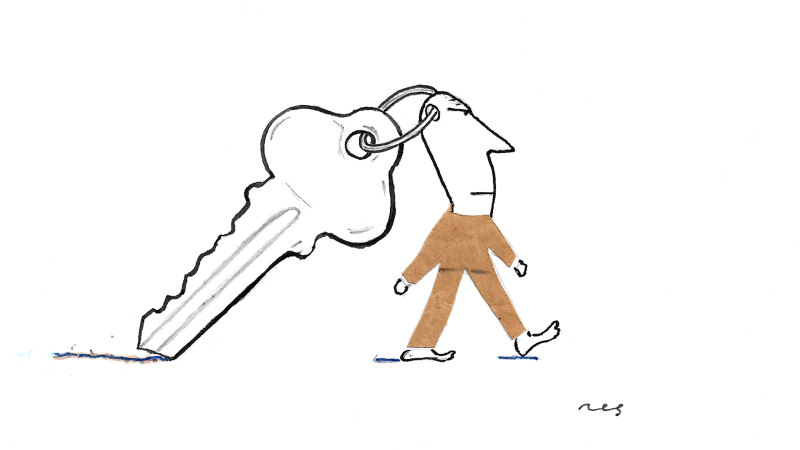
Another rate rise, but first home buyers are holding on … just
November 15, 2023Save articles for later
Add articles to your saved list and come back to them any time.
A common criticism made of Millennials is that we are people pleasers. We start sentences with an apology, work on days off, and convert older colleagues’ documents into PDFs even though the process remains unchanged from the previous seven times we showed them how to do it.
Credit: Reg Lynch
We would like to think we are collectively minded, and care about such issues as having a planet that is inhabitable in 50 years’ time or, at a minimum, one that does not resemble the planet where Obi-Wan fought Anakin in Revenge of the Sith (sorry, we Millennials had to watch those Star Wars movies). But we may have reached our limit.
Housing stress is typically defined as when a lower-income household spends more than 30 per cent of its gross income on housing costs. A more liberal definition might include the cash that renters put aside for an eventual deposit. For context, mortgage payments as a share of all Australian household disposable income have reached a record high of 9.5 per cent.
As a Millennial living in Sydney, you have to laugh. Perhaps we – and other first home buyers – are too stressed to be depressed, but a life with less than 30 per cent of your salary tied up in keeping a roof over your head feels like a fantasy. Housing stress is a way of life in this city. Get on in, the water’s fine (seriously, even Barangaroo is safe for swimming now). For those who saved enough to buy their first home in the past four years, the RBA has become like an over-eager local real estate agent. The first Tuesday of each month it knocks on the door: “Are you looking to sell?”
Yet we are holding on. New buyers had been expected to sell in distress after rolling off fixed rates. Instead, we’re clinging onto the property ladder with the pinky finger on our left hand.
RBA governor Michele Bullock announced an increase to interest rates on Tuesday.Credit: Oscar Colman
Savings accounts are being emptied into loan principals to refinance. Inheritance is being paid out early by parents who are not only still alive but often still in the workforce. Second jobs, lodgers, rented car spaces.
But, no. We haven’t sold the house. We might revert a Boomer’s PDF back to a doc, but return to renting one of their heavily subsidised investment properties we shall not.
And thus, on Tuesday RBA governor Michele Bullock announced the bank’s board would again raise the cash rate by 0.25 per cent. The big four took little time to pass on the increase. Could this bring the fire sales house hunters are waiting for?
As Taylor Swift will sing at Accor Stadium next year (her international concert tour’s high ticket prices have, coincidentally, created an inflationary wave wherever it goes): “It’s me. Hi. I’m the problem, it’s me.”
Many first home buyers who bought before interest rates started to rise are now in housing stress.Credit: Matt Davidson
That doesn’t mean we aren’t trying to pick up what the RBA is putting down. Whenever I spend $5 on milk, I make a point of shouting “my purchase is not an endorsement of this price point, I just can’t eat muesli dry” to the great monetary policy deity in the sky. We are cutting back where we can, poring over Woolworths’ half-off trough, googling “what does spoiled beef look like?” Unlike older generations, we are going out less, drinking less, ordering less takeaway. The fat has been trimmed, along with the grey bits on the discount meat.
Buoyed by the promise of interest rates coming down, Millennials will do everything to hold on. If we slip off the property ladder, who knows when and how we can climb back up.
And if we did sell, even with all of our frugality, banks are much less happy to see us to borrow again. No one was naive enough to think low interest rates would last forever, but, with a 3 per cent loan serviceability buffer, the question is now whether you can endure a 10 per cent interest rate.
Friends with young children – Millennials are aged 26 to 42 – don’t want to be thrown back into the rental market and face annual uncertainty of which school catchment they are in. Those of us without kids would simply like to be able to knock a nail in the wall.
Last year, just 55 per cent of Australians aged 25 to 39 were home owners compared with 66 per cent of Baby Boomers at that age. Boomers were three times more likely than Millennials to own their home outright before turning 40.
Maybe our expectations are too high. Should those in the inner suburbs move further out? They will need to drive more often, and fuel had the most significant price rise in the Australian Bureau of Statistics’ latest CPI report. If we are already in the western suburbs, could we fit a growing family into a smaller place?
Then again, maybe we can’t afford to stay in Sydney. Would the Central Coast like to receive some more young families, pushing up house prices and packing out childcare centres?
Of course, with more rate rises expected, Millennials, and the Gen Zs to come, will have to do something. It just may not be that pleasing.
They will put off having children and cut back on volunteering and giving to charity. They will leave jobs as nurses and teachers until everyone in this town is a corporate consultant earning double their previous salary. There will be plenty of work for them, providing the health and education departments with advisory reports on staff retention.
But, while the price of 2 litres of milk hovers close to $5 as supermarkets post billion-dollar profits, and while negative gearing cushions the blow for landlords, and home owners who bought 20 years ago continue life as normal, perhaps those of us at Woolies’ discount trough have pleased the RBA enough.
Mary Ward is a Sun-Herald reporter.
Get a weekly wrap of views that will challenge, champion and inform your own. Sign up for our Opinion newsletter.
Most Viewed in National
From our partners
Source: Read Full Article




